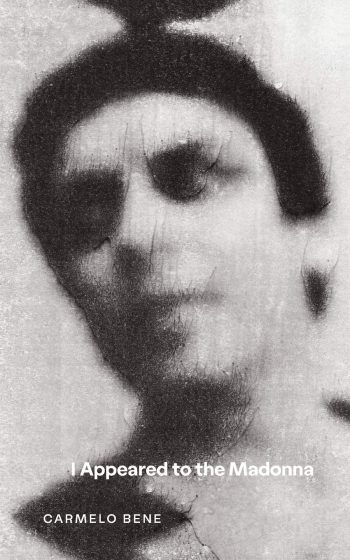 By CARMELO BENE (Contra Mundum; 2017/20)
By CARMELO BENE (Contra Mundum; 2017/20)
The indie publisher Contra Mundum Press deserves credit for putting out I APPEARED TO THE MADONNA, a book whose potential readership is not what anyone would call broad. It’s the second of two English language texts on the Italian actor-playwright-filmmaker Carmelo Bene (1937-2002) to be published in 2020 (the other being MY FILMS WITH CARMELO BENE). In previous years information about Bene was sparse-to-nonexistent outside Europe, so for those of us who value the man’s output this new Bene-ssance is thrice welcome. Let’s hope it continues.
I APPEARED TO THE MADONNA is an autobiography of sorts. It covers most of the major occurrences in Bene’s life, albeit in extremely unorthodox fashion, with Bene’s esoteric ruminations given prominence over factual detail—although precisely how much of what Bene details is truly factual is an open question. Among the “facts” included here are a recollection of how he once had to “leave town” due to controversy, the untimely death of his only son at age five and his decade-long filmmaking endeavors (which he dismisses as “an enormous waste of energy”).
I APPEARED TO THE MADONNA is an autobiography of sorts.
We also get Bene’s thoughts on the French symbolist poet Jules Laforgue (or more accurately a statement Laforgue once made about women, which with Bene vehemently disagrees), Salvador Dali (who’s remembered for informing Bene that “you cannot be a genius yet…You’re still an artist, but I’m a genius”) and William Shakespeare (“Will no longer wants his shake”). There’s also a 1995 “Autobiographical Portrait” that commences with a swirl of disjointed observations about theater and acting that’s closer to an extended prose poem than an autobiography, and so makes for a good introduction to what follows.
It’s illuminated by a sarcastic, self-mocking air that was a quintessential component of Bene’s stage and screen (and, evidently, literary) personas. That mockery takes the edge off many of Bene’s more garrulous claims (such as “anyone who intends to share “a life” with terrestrial woman ought to be arrested immediately and placed under psychiatric care”), although it’s safe to say this book will probably not be embraced by excessively woke or politically correct readers.
“anyone who intends to share “a life” with terrestrial woman ought to be arrested immediately and placed under psychiatric care”
Obviously a text as idiosyncratic as this one presents an English translator with quite a challenge (a friend who does movie captions once told me that Bene’s SALOME was “the single hardest film I’ve ever subtitled”), so Carole Viers-Andronico, who did the honors, deserves a round of applause. Not being an Italian speaker, I can’t gauge the accuracy of her translation, but the consistently unpredictable, free-form sentence structure (“He was assailed by the ridiculousness of the desolate failure of this simulated syntony, and his shame prompted him to disappear, down there, between the legs of the writing desk”) seems quite Bene-esque.
Of course Bene’s writing, like his filmmaking, is admittedly something of an acquired taste. It’s not like anything else, and a knowledge of figures like Pierre Klossowski, Michel Foucault and Giles Deleuze, all of whom are referenced at some length, is a requirement for any prospective reader of I APPEARED TO THE MADONNA. As I said, this is not anyone’s idea of a wide audience publication, but there is a definite cockeyed genius to it—a statement that applies to the entirety of Carmelo Bene’s oeuvre. It’s a shame that only a few of us will ever experience, much less appreciate, that genius.
